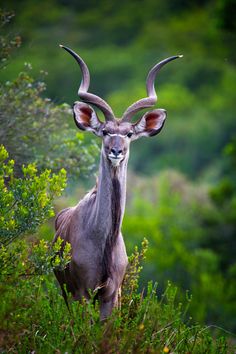The extinction of large animals from tropical forests could make climate change worse. New research reveals that a decline in fruit-eating animals such as large primates, tapirs and toucans could have a knock-on effect for tree species.
The extinction of large animals from tropical forests could make climate change worse — according to researchers.
New research reveals that a decline in fruit-eating animals such as large primates, tapirs and toucans could have a knock-on effect for tree species.
This is because large animals disperse large seeded plant species often associated with large trees and high wood density — which are more effective at capturing and storing carbon dioxide from the atmosphere than smaller trees.
Seed dispersal by large-bodied vertebrates is via the ingestion of viable seeds that pass through the digestive tract intact.
Removing large animals from the ecosystem upsets the natural balance and leads to a loss of heavy-wooded large trees, which means that less CO2 can be locked away.
Prof Carlos Peres, said: “Large birds and mammals provide almost all the seed dispersal services for large-seeded plants. Several large vertebrates are threatened by hunting.
But the steep decline of the megafauna in overhunted tropical forest ecosystems can bring about large unforeseen impacts.
“We show that the decline and extinction of large animals will over time induces a decline in large hardwood trees.
This in turn negatively affects the capacity of tropical forests to store carbon and therefore their potential to counter climate change.”
The research team studied data from more than 2,000 tree, and more than 800 animal species.
They found that frugivores which are not targeted by hunters — such as small birds, bats and marsupials — are only able to disperse small seeds, which are associated with small trees.
Meanwhile large heavy-wooded trees, which can capture and store greater amounts of carbon, are associated with larger seeds. And these are only dispersed by large animals.
Prof Mauro Galetti said: “The big frugivores, such as large primates, the tapir, the toucans, among other large animals, are the only ones able to effectively disperse plants that have large seeds.
Usually, the trees that have large seeds are also big trees with dense wood that store more carbon.
Carolina Bello, a PhD student, added: “When we lose large frugivores we are losing dispersal and recruitment functions of large seeded trees and therefore, the composition of tropical forests changes. The result is a forest dominated by smaller trees with milder woods which stock less carbon.”
Prof Peres added: Our research shows that a decline in large vertebrate populations and the loss of key ecological interactions also poses a serious risk for the maintenance of tropical forest carbon storage.
“We hope that our findings will encourage on Reducing Emissions from Deforestation and Forest Degradation (REDD+) to consider faunally intact forests and their full functionality as a critical precondition of maintaining forest carbon stocks.”
Source: Science daily
N.H.Kh

